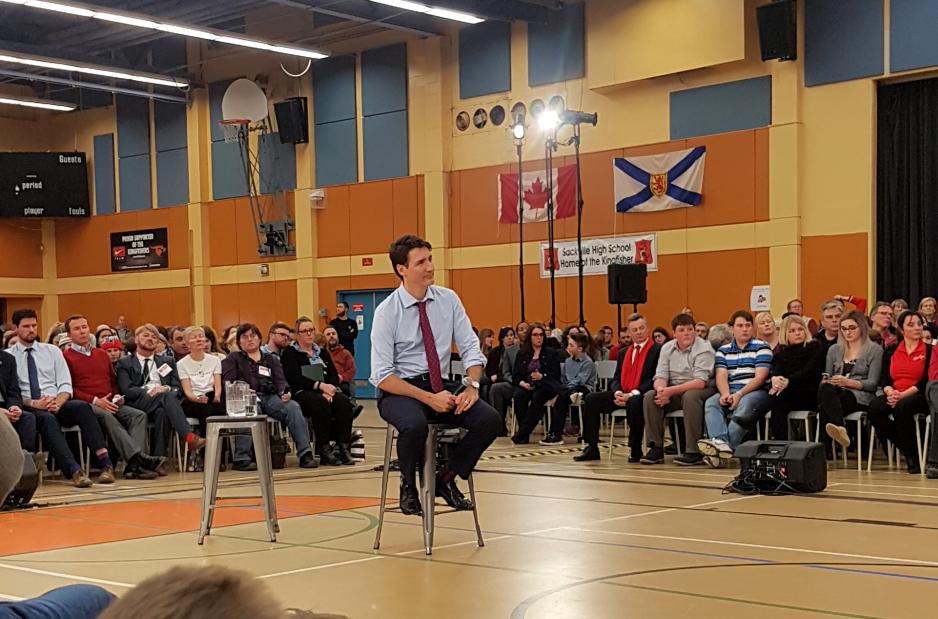Prime Minister Justin Trudeau Wins a Second Time

Prime Minister Justin Trudeau wins for a second time. (Photo credit: Coastal Elite from Halifax, Canada)
Although the liberals won their second government in a row, they won with far fewer votes and seats than last time. What does this look like in the North?
On October 21st 2019 Canadians went to the polls to vote for a new government. For a second time, Justin Trudeau, the leader of the Liberal party, won the most seats. However, unlike the 2015 election, the Liberals only received enough seats to create a minority government. The northern regions saw both consistency in their electorates, but also some interesting changes.
Elected Officials
Each of the three northern territories have one Member of Parliament, or one seat in Parliament. In the 2015 election, all three of these seats were elected Liberal. Now, two of them are incumbent Liberals and one is from the New Democratic Party (NDP).
The Yukon re-elected Larry Bagnell, who won a very close race by only 164 votes.
The Northwest Territories re-elected Michael McLeod with a comfortable lead in the polls.
Nunavut, however, did not re-elect a Liberal, instead opting for the New Democratic Party’s candidate. Mumilaaq Qaqqaq, a 25 year old Inuk woman, won the seat with a healthy amount of the votes.

A map of the 2019 Federal election. Photo Credit: DrRandomFactor
She released a video on Facebook after she won, which speaks to her excitement and gratitude. On a second Facebook message she released the day after the election, Qaqqaq said, “I am going to spend time with my hometown today, I am going to spend time with my family, spend time with my friends.”
As for the other northern regions, Nunavik (northern Quebec) went to the Bloc Québécois a seperatist party focused on Quebec nationalism and separatism, and Nunatsiavut (northern Labrador) re-elected incumbent Yvonne Jones of the Liberal party.
Campaign
The federal election campaign which began on September 11th 2019, was by many accounts a challenging one. The 40-day campaign was seen as one that rarely focused on issues, and instead focused on mud-slinging and harsh personal critiques.
As professor Danie Beland from McGill University said to the CBC, "They [politicians] have not really galvanized Canadians this time around. It's quite a different campaign than 2015 — more nasty in tone, with the message being about who not to vote for than who to vote for,"
It's quite a different campaign than 2015 — more nasty in tone, with the message being about who not to vote for than who to vote for.
As for the North, it was barely seen in the campaign. Only one of the federal leaders, Justin Trudeau, visited the territories during the campaign, and he only went to one territory: Nunavut, which he lost.
Even though many of the issues of the 2019 campaign focused on important issues for the North, the region was not often brought up. Climate change, Indigenous rights, and housing affordability were all at the forefront of the campaign and are all incredibly important issues in the North, yet the focus remained on provinces instead of territories.
Moving Forward
During Prime Minister Justin Trudeau’s first mandate, he focused on northern issues, building government-to-government relationships with Indigenous peoples across the country, climate change, and spoke to many other pertinent issues in the North.
His government released a new Arctic Policy Framework, which was promised early in his first mandate. However, the announcement was met with little fanfare and was released a day before the 2019 election begun. Will northern issues remain at the forefront of the new government’s mandate?
Also read
Another question will be if there will be a northern cabinet minister in this government. Hunter Tootoo was the Liberal MP from Nunavut in 2015 and was given the position of Minister of Fisheries, Oceans and the Canadian Coast Guard.
However, Tootoo resigned from the position in 2016 and was removed from the Liberal caucus after a scandal.
With only two Liberal territorial MPs, the question would be if Larry Bagnell or Michael McLeod will receive a position in the Cabinet. In the past, McLeod has commented to the CBC, that he would be interested in such a position, “I've always indicated I'm interested in sitting on cabinet, I've informed the Prime Minister's Office before [and] I've informed him again — his office — that I'm interested."
Having a cabinet minister from the North would should the importance that the region plays in the priorities of the new government.

